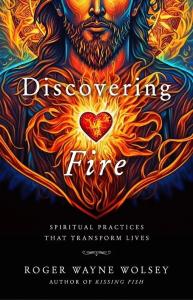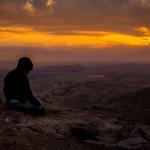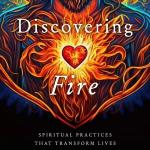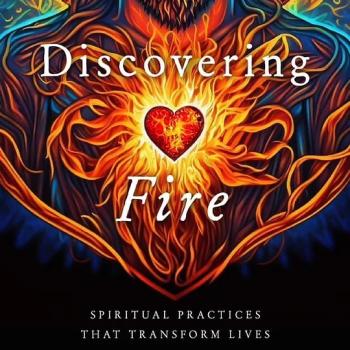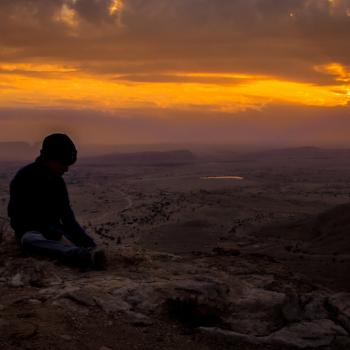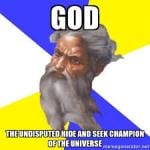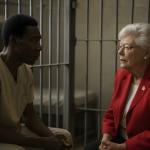…Another contemplative spiritual practice that works well in tandem with centering prayer is LECTIO DIVINA – Latin for “Divine Reading.” What I’m about to say may be new to many – including many Christians: one can do Lectio Divina, a divine reading, of any sort of text – not just the Bible. I want to put this out there first to help those whose eyes might normally glaze over when coming across something that seems to be “about the Bible.” Indeed, one can employ a Lectio approach to watching a movie, experiencing a statue or a painting, or a piece of music, a story in the news, or even a fellow human being – I’ll share about that in Chapter 3.
 Lectio began as a way to approach encountering the Bible. Mainline and progressive Christianity fully embrace the “historical-critical” approach to understanding scripture – giving great consideration to the best scholarship available seeking to understand the context a given text was written, by whom, for whom, when, where, and why. This approach seeks to discern what issue or problem of the day it was responding to and how the original audience likely interpreted it. That’s fine and well. There is great merit to this approach as it helps us to realize that the scriptures were written by fallible humans who had various agendas in what they wrote, and thus it helps us to not make an idol of the Bible or read it too literally. Moreover, employing a liberationist lens is a significant aide in helping us to fathom how those texts would’ve especially been interpreted by oppressed persons, the poor, women, servants, slaves, etc. living in the midst of oppressive empire – then and now.
Lectio began as a way to approach encountering the Bible. Mainline and progressive Christianity fully embrace the “historical-critical” approach to understanding scripture – giving great consideration to the best scholarship available seeking to understand the context a given text was written, by whom, for whom, when, where, and why. This approach seeks to discern what issue or problem of the day it was responding to and how the original audience likely interpreted it. That’s fine and well. There is great merit to this approach as it helps us to realize that the scriptures were written by fallible humans who had various agendas in what they wrote, and thus it helps us to not make an idol of the Bible or read it too literally. Moreover, employing a liberationist lens is a significant aide in helping us to fathom how those texts would’ve especially been interpreted by oppressed persons, the poor, women, servants, slaves, etc. living in the midst of oppressive empire – then and now.
One can, however, embrace all of that and still benefit by experiencing the Bible on a different level, in a different way – sacramentally. A sacrament is a “means of grace” – a way humans can directly experience the loving presence of the Divine. Most Christians think of baptism and communion as the sacraments shared in common by most every denomination. Origen of Alexandria introduced the notion of experiencing the Bible as sacrament in the 2nd Century C.E., that we can experience the living God directly through engaging with the biblical texts. This is a mystic approach to experiencing scripture. He wrote, “When you devote yourself to the divine reading…seek the meaning of divine words which is hidden from most people.”
In the 6th Century, Benedict of Nursia established Lectio Divina as a monastic practice and it was eventually set as a process involving four steps by Guigo II, a Carthusian monk, during the 12th Century. Basically, you, or someone with you, reads it aloud four times, and you experience the text read aloud with a different filter/intention each time. The specifics of those four steps have changed over the years. Guigo’s version had it as: “Lectio/read it, Meditatio/meditate (meaning think and imagine about it), Oratio/pray (meaning converse with God about it), Contemplatio/contemplate (ponder what God may be inviting, teaching, urging you).” St. Francis’s colleague, Claire of Assisi, offered it as: “gaze, consider, contemplate, imitate.” And, since the practice was opened up to the masses in Vatican II, people have created variations of the lenses and intentions for each of the four steps.
Many centering prayer practitioners read and listen with the filters/lenses of: “Sense. Notice. Feel. Discern.” Specifically, 1) what do I observe with my senses when hearing this text? What do I “see”? What “sounds” do I hear? What do I taste? What do I sense with my skin? 2) What word or phrase within this text calls or speaks to me? 3) What emotion(s) do I feel upon hearing this passage? 4) What might this passage be inviting me to do?
What’s in common is that it is a three or four step process that involves experiencing a small portion of scripture – typically a passage of 5-15 verses – that you allow yourself to experience as a window to God, a being in God’s presence, a reminder of who and Whose you are, and an invitation to live life just a bit differently due to encountering the Divine in this way. It’s less an appeal to the head, and more to the heart. Here’s how I typically do it: I choose a passage, for instance, John 5:1-11 (NCV)
Later Jesus went to Jerusalem for a special feast. In Jerusalem there is a pool with five covered porches, which is called Bethesda in the Hebrew language. This pool is near the Sheep Gate. Many sick people were lying on the porches beside the pool. Some were blind, some were crippled, and some were paralyzed, and they waited for the water to move. Sometimes an angel of the Lord came down to the pool and stirred up the water. After the angel did this, the first person to go into the pool was healed from any sickness he had. A man was lying there who had been sick for thirty-eight years. When Jesus saw the man and knew that he had been sick for such a long time, Jesus asked him, “Do you want to be well?” The sick man answered, “Sir, there is no one to help me get into the pool when the water starts moving. While I am coming to the water, someone else always gets in before me.” Then Jesus said, “Stand up. Pick up your mat and walk.” And immediately the man was well; he picked up his mat and began to walk. The day this happened was a Sabbath day. So the [Jewish leaders] said to the man who had been healed, “Today is the Sabbath. It is against our law for you to carry your mat on the Sabbath day.” But he answered, “The man who made me well told me, ‘Pick up your mat and walk.’ ”
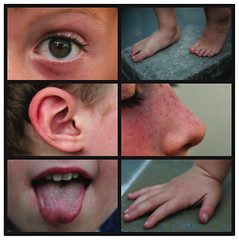 I read the text aloud the first time with a focus on Sensing. I “feel” the heat of the Sun beaming on stone city streets. I “see” masses of people in an ancient city gathering for an event. I see a pool of cool water with a still surface. I hear hurting people laying around it – sighing and groaning, like the despondent sighs of homeless people in today’s urban parks. I imagine seeing a white dove, landing in the pool, taking a drink, and flapping its wings to take off, troubling the waters as it does, and then people scrambling to touch the water first. What I really see is stillness and hot, hopeless, listless people waiting. Then I feel a sudden coolness, like the sun is beating less harshly, I look up and see that I’m in the shadow of a strange man. A man wearing a heather tunic with a healer’s bag around his waist. I see myself looking through the eyes of the crippled man on his mat into the caring brown eyes of this strange soul. I feel that healer man’s concern – it radiates from him. I see myself suddenly standing up and walking! I feel joy.
I read the text aloud the first time with a focus on Sensing. I “feel” the heat of the Sun beaming on stone city streets. I “see” masses of people in an ancient city gathering for an event. I see a pool of cool water with a still surface. I hear hurting people laying around it – sighing and groaning, like the despondent sighs of homeless people in today’s urban parks. I imagine seeing a white dove, landing in the pool, taking a drink, and flapping its wings to take off, troubling the waters as it does, and then people scrambling to touch the water first. What I really see is stillness and hot, hopeless, listless people waiting. Then I feel a sudden coolness, like the sun is beating less harshly, I look up and see that I’m in the shadow of a strange man. A man wearing a heather tunic with a healer’s bag around his waist. I see myself looking through the eyes of the crippled man on his mat into the caring brown eyes of this strange soul. I feel that healer man’s concern – it radiates from him. I see myself suddenly standing up and walking! I feel joy.
I then pause for 30 seconds, and read the text a second time aloud, this time Noticing if there’s a word or phrase that jumps out to me. In this instance, “Do you want to be well?” Wow. That’s quite a question. I find myself wondering if there are parts of me that might be resistant to really being made well. Have I become a bit too attached to some of my hurts and failings? Has my identity become a bit too caught up in seeing myself as a victim, loser, the guy who missed out on his chance for love in life, etc.? The question is rhetorical. Hell yeah it has.
I then pause for 30 seconds, and read it aloud again, this time with the lens/filter of Feeling the passage, how it makes me feel, its effect on my emotions. What is the feeling(s) that it evokes in me? I feel at first a hint of embarrassment about being seen by God as a bit resistant to actually healing. It’s pretty vulnerable having that part of me seen. And then, I feel some shock and dismay about being healed. I’ve felt this way for years, I’ve gotten used to it. What’s going on? Can I handle this? And then, I feel an even stronger feeling of elation and joy about having the broken parts of me healed. It feels good to be made whole. I feel elated!
I pause for 30 seconds, and read it aloud again, this time with the filter of Discerning. What might this passage of scripture be inviting me to do? How might it be calling me to respond? …I’ve become a bit too attached to the notion that “I missed my chance in my love life.” That I met “the love of my life, screwed it up, and I’m destined to a life of grieving and regret.” Perhaps I might benefit by seeing a therapist again. Maybe some more EMDR might help. Perhaps I should finally contact that spiritual director who reached out to me a few months ago. Perhaps I could do a visualization exercise where I more keenly “cut the energetic cords” that I had with this former lover. Maybe even getting out the biggest knife in my kitchen and physically cut through some actual, or imaginary, cords – and set myself even more free.
I’m also noticing a sense of calling to challenge religious leaders who have the gall to say that any form of healing is “against our law.” The name Jesus is the Latinized form of Jesu, the Greek form of the Hebrew word Yeshua/Joshua – which means “God saves/heals.” The idea puny, micromanaging, humans – including “ordained people of the cloth” would dare to say what forms of healing/saving are “allowed” – is abhorrent – and toxic to any faith which seeks to not become a relic of the past.
 Again, one can employ a Lectio approach to most anything, not just official “holy scriptures.” One can do it with a passage from a novel, a portion of a divorce decree, a part of a poem, or even with a piece of art, a YouTube clip, a podcast, a news-story, or with experiencing an animal out in nature, or a person sitting across from you on the bus or airplane – though it might be a bit weird if you stare at them too much. Use discretion. The basic questions remain, however, “how might God be showing up in whatever I’m encountering and what divine gift or insight might there be for me in this encounter if consciously I take the time to notice?”
Again, one can employ a Lectio approach to most anything, not just official “holy scriptures.” One can do it with a passage from a novel, a portion of a divorce decree, a part of a poem, or even with a piece of art, a YouTube clip, a podcast, a news-story, or with experiencing an animal out in nature, or a person sitting across from you on the bus or airplane – though it might be a bit weird if you stare at them too much. Use discretion. The basic questions remain, however, “how might God be showing up in whatever I’m encountering and what divine gift or insight might there be for me in this encounter if consciously I take the time to notice?”
These words above are an excerpt of my new book Discovering Fire: Spiritual Practices That Transform Lives – available April 4, 2023.
XX- Roger
Rev. Roger Wolsey is a certified Spiritual Director, United Methodist pastor, and serves on the Board of Directors of ProgressiveChristianity.Org. He is a contributing writer for the Progressing Spirit newsletter, and author of Kissing Fish: christianity for people who don’t like christianity
His new book, Discovering Fire: Spiritual Practices That Transform Lives, will be released April 4, 2023.![]()
![]()
Roger’s other blogs on Patheos
If you would like to become a patron of Roger’s work as a spiritual writer, please click Here to learn more.

